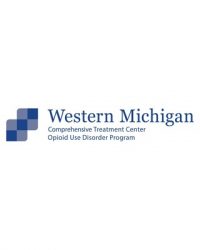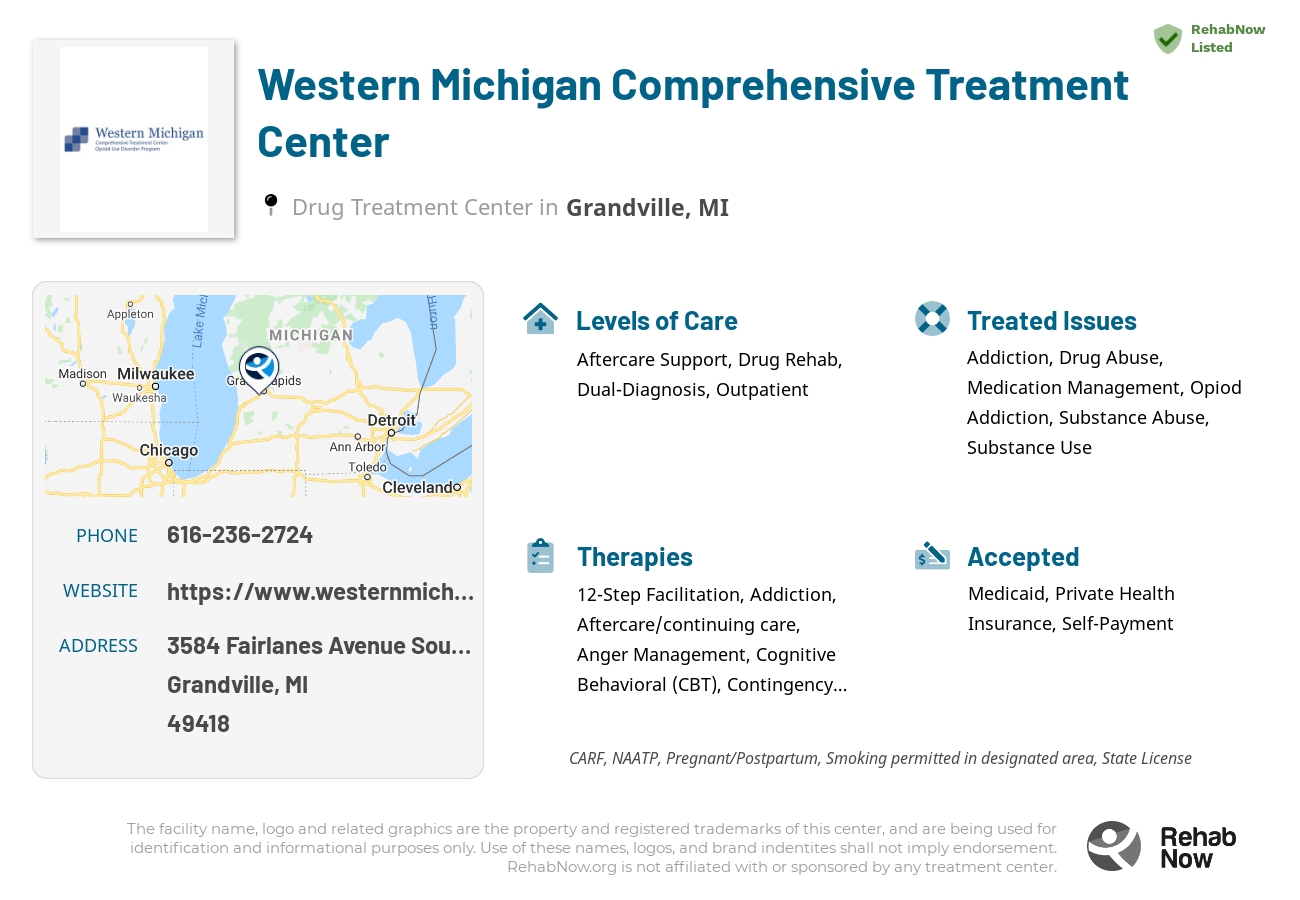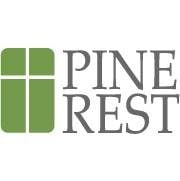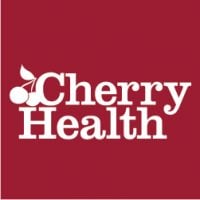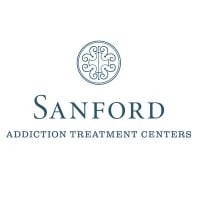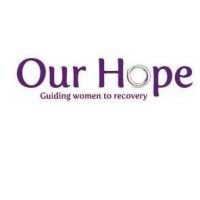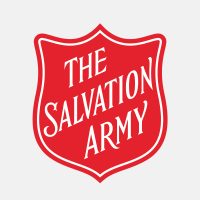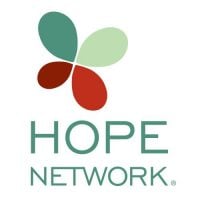Western Michigan Comprehensive Treatment Center
Drug Rehab Center in Grandville, Michigan
Western Michigan Comprehensive Treatment Center is an outpatient facility that specializes in evidence-based treatments, including medication-assisted treatment and talk therapy, and offers recovery support services for individuals with opioid use disorder.
About This Grandville, MI Facility
Western Michigan Comprehensive Treatment Center (WMCTC) is a state-of-the-art outpatient treatment facility located in Grandville, Michigan. The center specializes in treating individuals with opioid use disorder, aiding people of all ages as they seek recovery from opioid addiction and chemical dependency. WMCTC is staffed by an interdisciplinary team of compassionate and experienced professionals, including doctors, nurses, counselors, and medical support staff. They offer a full range of evidence-based treatments tailored to each individual’s unique needs, including medication-assisted treatment (MAT), talk therapy, and recovery support services.
At WMCTC, patients have access to a variety of holistic treatments designed to support their recovery journey. MAT is a cornerstone treatment at the center, combining medication and counseling to allow individuals to stabilize their brain chemistry while working on their recovery goals. Talk therapy is also used at WMCTC to provide clients with strategies and coping skills to help manage their substance use disorder. In addition, clients receive access to recovery support services such as life skills coaching, relapse prevention planning, and referral services.
WMCTC is accredited by the Joint Commission and has a certification from the Michigan Department of Health and Human Services. In addition, the center has received the Suboxone Recognition Program Certification from the Substance Abuse and Mental Health Services Administration (SAMHSA). WMCTC also offers programs for alumni, their family and friends, so that everyone affected by substance use disorder can find the support and resources they need for lasting recovery.
Genders
Ages
Modality
Additional
Conditions and Issues Treated
Substance abuse refers to the intensive and inappropriate use of psychoactive substances. These include illegal drugs, alcohol, and even the excessive use of prescription drugs. Overuse of these substances leads to severe physical or psychological dependence.
Substance abuse is treatable and the duration of treatment and most successful sobriety can require weeks or months of professional care at Western Michigan Comprehensive Treatment Center in Grandville.
Opioid addiction treatment facilities like Western Michigan Comprehensive Treatment Center support people struggling with opioid dependency, which covers illegal and prescription opioids. People often abuse prescription opioids to get high instead of adhering to a medical provider’s directions. Addiction forces people to crave for opioids impulsively without factoring in the dangers these drugs bring to them.
Most opioid addiction treatment plans include detoxification and subsequent medications to ease the process. However, that’s only the beginning. Behavioral therapies and counseling are also necessary to resolve the root cause of addiction. This overall approach decreases the likelihood of falling off the wagon. In some instances, therapies can be done at home.
Addiction is often caused by an underlying issue. Mental illnesses like schizophrenia, bipolar disorder or anxiety disorder could lie at the root. A dual diagnosis by Western Michigan Comprehensive Treatment Center aims to treat the addiction as well as the cause of the addiction. This ensures the patient will not fall back on old ways after treatment is complete.
Levels of Care Offered
This center offers a variety of custom treatment tailored to individual recovery. Currently available are Aftercare Support, Detox, Drug Rehab, Dual-Diagnosis, Outpatient, with additional therapies available as listed below.
Detox is the stage of recovery where the drugs or alcohol are fully removed from your body. As you stop using, your body metabolizes the last dose or drink and starts sending triggers to your brain to get more. These cues lead to cravings. If additional substances are not obtained you begin to go through withdrawal. Your body begins to reset chemical pathways and other metabolic processes begin which can be extremely uncomfortable.
There are two different ways to detox, with medications and without. Depending on your level of addiction and what you are using, you may need medical supervision. For many drugs and alcohol, the acute phase of detox can be completed in a number of days. Cravings and certain longer-term withdrawal symptoms may remain for longer as your body completely rids itself of the drug and relearns how to function without it.
Outpatient treatment plans cover diagnosis, detoxification, management, and counseling. They are a popular option for those who have graduated from inpatient facilities. Services in Michigan include medication-assisted treatment (MAT) and individual and group therapy.
Aftercare support plays an important role when sustaining a patient’s full recovery at Western Michigan Comprehensive Treatment Center. Patients also receive assistance in making living arrangements in halfway houses. Career counseling is available for those who want a fresh start. There are also local community programs in Grandville, MI such as Alcoholics Anonymous.
Western Michigan Comprehensive Treatment Center‘s Therapies & Programs
Couples therapy reduces the dysfunctional behavior in a relationship that may cause addiction. It can help one or both members of the couple. It targets addiction and it can make for a healthier relationship.
Patients who receive generous support from their loved ones have better chances of completing their recovery. Genetics play a role when it comes to addiction, so it’s better to approach the problem as a unit. Family members can help an individual avoid addiction triggers and guide him or her in making lifestyle changes.
Group therapy is a type of counseling at Western Michigan Comprehensive Treatment Center in Grandville, MI that occurs between a bunch of strangers. The goal of group therapy sessions is to foster hope and a sense of belonging. It also helps to have people who can relate to what you’re going through. Good behaviors can also be contagious.
As a means of managing pain that has plagued them in the past, many individuals turn to drugs and alcohol. Assault, negligence, the loss of a loved one, and other unfortunate events may involve trauma. This treatment, offered and administrated by Western Michigan Comprehensive Treatment Center in Grandville, MI provides individuals the resources to cope with past traumas healthily.
Dialectical behavioral therapy focuses on eliminating negative thoughts such as suicidal thoughts. It is useful in the treatment of patients with uncontrollable emotions. The term “dialectic” means the integration of opposites. In the substance abuse context, DBT refers to accepting the patient’s addiction.
Alcoholics Anonymous is the original 12-Step program that established the model that other 12-Step programs, like Narcotics Anonymous, follow. 12-Step programs are support groups that are led and run by members of each group. These groups use the “Big Book,” which contains the 12-Step philosophy of recovery and ongoing abstinence from drugs or alcohol.
Contingency Management (CM) is based on the principle that consequences influence the behaviors of an individual. It promotes desired behavior by giving rewards while discouraging unwanted behaviors. CM is used for individuals who need therapy for more than 3 months. It has the advantage of being implemented by family members.
Payment Options Accepted
For specific insurance or payment methods please contact us.
Is your insurance accepted?
Ask an expert, call (888) 674-0062
Additional Details
Specifics, location, and helpful extra information.
Grandville, Michigan 49418 Phone Number(616) 236-2724 Meta DetailsUpdated November 25, 2023
Staff Verified
Patient Reviews
There are no reviews yet. Be the first one to write one.
Grandville, Michigan Addiction Information
Michigan has the second-highest rate of drug and alcohol abuse in the nation. Heroin is linked to more than 50% of the state's hepatitis C cases. Marijuana is the drug most often associated with crimes in Michigan, followed by methamphetamines. Opioids alone are responsible for almost 20% of all drug overdose deaths in Michigan.
Drug addiction is a problem in Grandville, Michigan. In 2013, there were 298 drug overdose deaths in Michigan. That amounts to a rate of 11.8 deaths per 100,000 people. Additionally, 5.4% of residents reported using illicit drugs, and 10% of high school students reported using illicit drugs. There are various programs and approaches to drug rehab, but typically they will involve some combination of detoxification, counseling and therapy, and relapse prevention education.
Treatment in Nearby Cities
- Plymouth, MI (122.8 mi.)
- Hancock, MI (322.9 mi.)
- Portland, MI (43.9 mi.)
- Dowagiac, MI (65.6 mi.)
- Roscommon, MI (125.4 mi.)
Centers near Western Michigan Comprehensive Treatment Center
The facility name, logo and brand are the property and registered trademarks of Western Michigan Comprehensive Treatment Center, and are being used for identification and informational purposes only. Use of these names, logos and brands shall not imply endorsement. RehabNow.org is not affiliated with or sponsored by Western Michigan Comprehensive Treatment Center.
